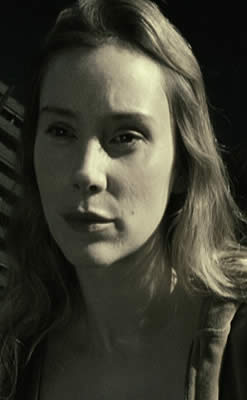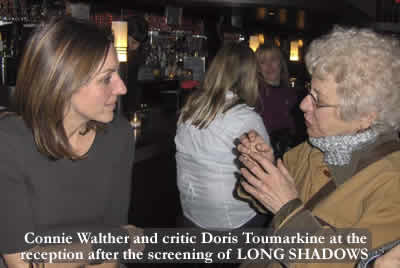In November 2004, German Film Services launched German Premieres, an ongoing presentation of new and noteworthy German films for the US market. This very successful screening series opened with Dennis Gansel’s NAPOLA. Since then, German Film Service NY representative Oliver Mahrdt has presented more than 15 films to the NY industry, ranging from such high-end documentaries as Thomas Grube’s TRIP TO ASIA (2008) to low-budget indie films like Robert Thalheim’s NETTO (2005).
Earlier this December, German filmmaker Connie Walther arrived in New York to present her latest feature film, SCHATTENWELT (Long Shadows) (2008).Walther’s film tells the tragic story of Valerie, a young woman struggling for closure in the face ofthe loss of her father at the hands of terrorists. When she learns that the possible perpetrator, Widmer, is going to be released from prison after serving 20 years, she sets up an intricate plan to take revenge. Rather than focusing on the prisoner and the challenges he faces upon returning to civilian life, Walther’s film is far more interested in exploring the scars left on the second and third generations of both victim and perpetrator.
Valerie’s quest for vengeance climaxes when she accompanies Widmer on a trip to Berlin to meet his grown-up son, Samy, for first time since imprisonment. In a violent and highly charged encounter between the three parties, history repeats itself, and Samy’s boyfriend  becomes the innocent victim of that confrontation, in a reenactment of the demise of Valerie’s father.
becomes the innocent victim of that confrontation, in a reenactment of the demise of Valerie’s father.
Slowly paced with long silences, this quiet yet intense film offers the audience space to reflect on the complex issues of guilt, atonement, revenge, redemption, and the retribution it addresses. Unlike other films on the same subject matter, Walther does not glamorize or idealize the former terrorists, but depicts their struggle to survive in a society that no longer shares or even understands the idealism that once motivated them.
German actors Ulrich Noethen and Franziska Petri offer strong and convincing performances as Widmer, the ex-terrorist, and Valerie, the victim. Throughout the film, the roles of victim and perpetrator are constantly challenged and reversed. One of the film’s strong points is that neither of the two protagonists ever lets their guard down.
Connie Walther’s thought-provoking LONG SHADOWS had its world premiere at the Rome International Film Festival and will open in German theaters next spring. LONG SHADOWS follows a long list of films by German filmmakers looking at the Baader Meinhof Gang, the Red Army Fraction (RAF) and the aftermath of West Germany’s terrorism. What follows is a very limited selection of some noteworthy films that deal with the subject matter.
The 1978 anthology work GERMAN AUTUMN weaves together fact and fiction in an immediate response to the traumatizing RAF terrorism events of 1977, termed the GERMAN AUTUM. by some of the then prominent new German filmmakers, like Edgar Reitz, Alexander Kluge, Rainer-Werner Fassbinder, Volker Schloendorf and others.
 Another film that comes to mind is Margarete von Trotta’s 1981 feature DIE BLEIERNE ZEIT (THE GERMAN SISTERS), loosely based on the life and times of RAF founding member Gudrun Ensslin and her sister. Christian Petzold’s haunting fiction film DIE INNERE SICHERHEIT (THE STATE I AM IN, 2000) tells the story of a contemporary ex-terrorist couple who has been living underground for decades and their teenage daughter’s need for a regular life. The impressive documentary BLACK BOX BRD (2001) by Andreas Veiel juxtaposes the portrait of Wolfgang Grams, a third generation descendant of RAF terrorists, with the banker and RAF victim Alfred Herrenhausen. The film poses many questions, leaving most of them unanswered.
Another film that comes to mind is Margarete von Trotta’s 1981 feature DIE BLEIERNE ZEIT (THE GERMAN SISTERS), loosely based on the life and times of RAF founding member Gudrun Ensslin and her sister. Christian Petzold’s haunting fiction film DIE INNERE SICHERHEIT (THE STATE I AM IN, 2000) tells the story of a contemporary ex-terrorist couple who has been living underground for decades and their teenage daughter’s need for a regular life. The impressive documentary BLACK BOX BRD (2001) by Andreas Veiel juxtaposes the portrait of Wolfgang Grams, a third generation descendant of RAF terrorists, with the banker and RAF victim Alfred Herrenhausen. The film poses many questions, leaving most of them unanswered.
Documentary filmmaker Gerd Conradt’s STARBUCK HOLGER MEINS (2001), is the portrait of his fellow film student Holger Meins, who later joined the Baader Meinhof Gang and then died in prison after a hunger strike. The feature STILLE NACH DEM SCHUSS (THE LEDGENDS OF RITA, 2000) by Volker Schloendorf is inspired by the life of Inge Viet, another RAF member who fled to East Germany and assumed a new identity.
Christopher Roth’s BAADER (2002) is a highly controversial pop portrait of Andreas Baader, one of the founding members of the Baader Meinhof Gang and RAF. This year brings Uli Edel’s THE BAADER MEINHOF COMPLEX (2008), featuring the crème de la crème of German acting talent. The film has just received a Golden Globe nomination for best foreign film. The fact that Christian Klar, one of the leading figures of the second RAF generation, will soon be released after serving 26 years, has raised a lot of discussions and controversies in Germany. And it proves what Connie Walther’s film suggests: the story continues…
For more information on LONG SHADOWS, please visit: www.longshadows-the-movie.com

